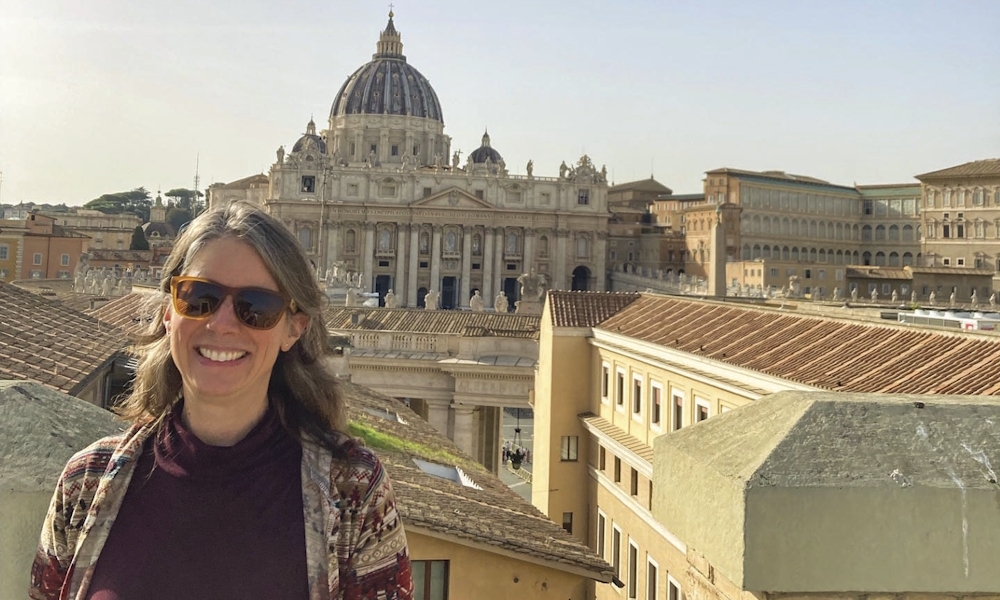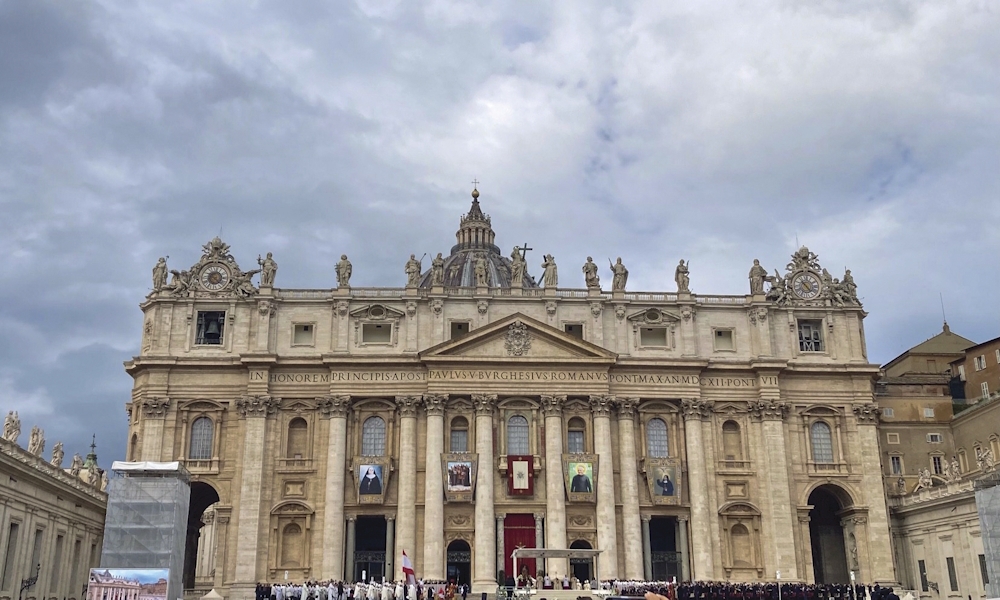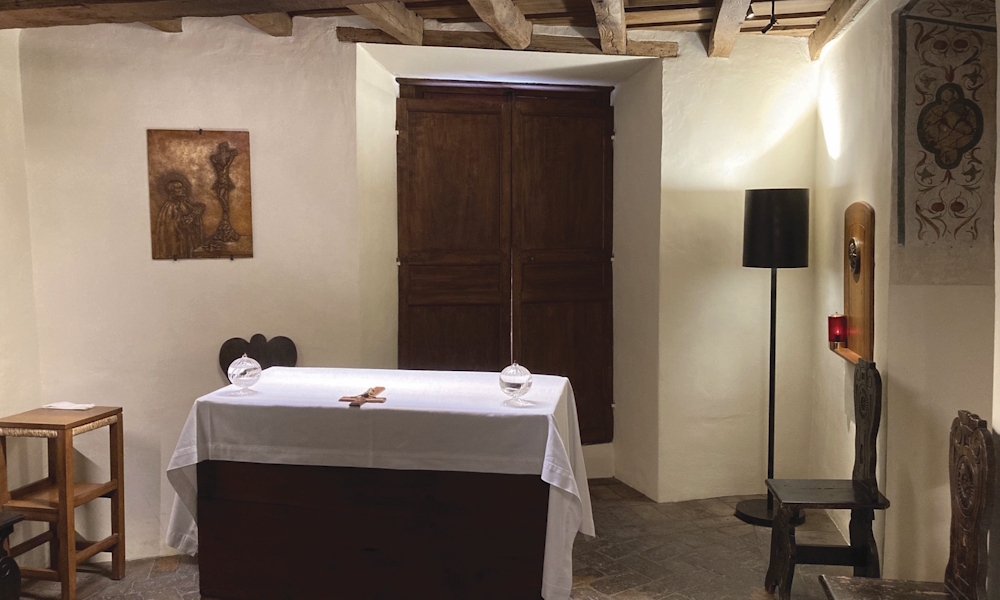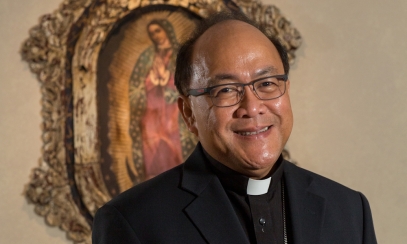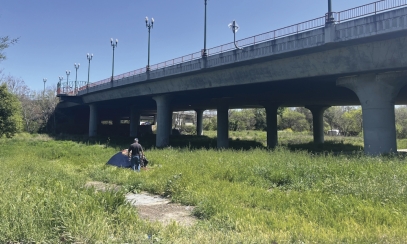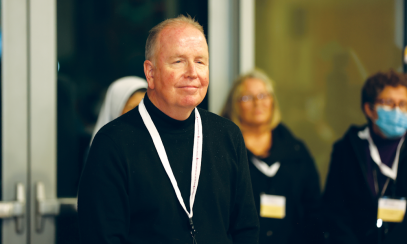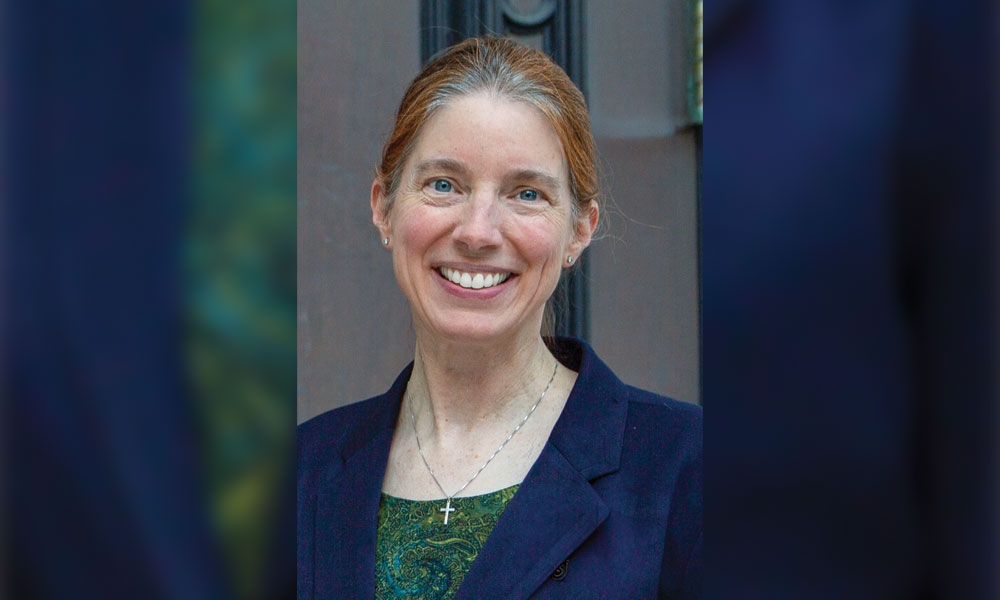
Leaven for the Body of Christ
Amy Cooprider on Rome, Synodality, and the Power of Listening
Amy Cooprider on Rome, Synodality, and the Power of Listening
In March 2020, Pope Francis announced that there would be a 16th general assembly of bishops to examine the question, broadly speaking, “How can we, as a Church, listen better?” From 2022 to 2024, the Synod on Synodality, or the Universal Synod, as it is commonly known, was attended by a diverse cross-section of delegates from around the world. These delegates reflected on, defined, and strategized what it means to truly meet (Synod comes from the Greek word for meeting.) and listen to one another, that we may move forward as a synodal Church.
A contingent of Synod delegates wanted to hear from students. Through an organization called CENTERS (Catholic Education Network to Encounter Rome and Synodality), Amy Cooprider, along with dozens of graduates and undergraduates from universities across the country, was selected to participate in a special student listening session during the Synod.
In March 2020, Pope Francis announced that there would be a 16th general assembly of bishops to examine the question, broadly speaking, “How can we, as a Church, listen better?” From 2022 to 2024, the Synod on Synodality, or the Universal Synod, as it is commonly known, was attended by a diverse cross-section of delegates from around the world. These delegates reflected on, defined, and strategized what it means to truly meet (Synod comes from the Greek word for meeting.) and listen to one another, that we may move forward as a synodal Church.
A contingent of Synod delegates wanted to hear from students. Through an organization called CENTERS (Catholic Education Network to Encounter Rome and Synodality), Amy Cooprider, along with dozens of graduates and undergraduates from universities across the country, was selected to participate in a special student listening session during the Synod.
Listening to Students
A graduate student in Santa Clara University’s Pastoral Ministry program, Amy has spent most of her career building satellites. She recalled, “I have only ever wanted to build spacecraft, so most of my career has been around things to do with satellites.” Faith has always been important to Amy, who had an aunt who was an Episcopalian priest whose theology books fascinated her.
Students from SCU and other universities who traveled with Amy collectively shared an uncertainty of what to expect in Rome. Amy reflected that this worked in their favor. “I think we went in necessarily with much more open hearts and minds.” Leading up to the listening session, the group toured the holy sites of Rome, worshiped together, and ate with various Vatican leaders such as Sister Nathalie Becquart, the undersecretary of the Synod of Bishops, the first woman ever to hold that position.
On the Synod Floor
On the day of the listening session, the students learned that it would be the first time that livestreaming would be used in the Vatican. Before entering the Paul VI Audience Hall, they met Thierry Bonaventura, the secretariat of the Synod, who is credited with coming up with the idea for students to participate in the assembly.
Amy recounted, “Theirry emphasized that we were representing all students — not just ourselves — and he described the hall as a private, spiritual, sacred space.” Seated at their tables on the synod floor, the students were then addressed by Bishop Flores of the Diocese of Brownsville; Sister Leticia Salazar, Chancellor of the Diocese of San Bernardino; Cardinal Grech, the Secretary General for the Synod; and Cardinal Hollerich of Luxembourg. For details of the session, click here.
Personal Pilgrimage
Amy found her Rome trip transformational. “I didn't realize I was on a pilgrimage until it was almost done.” She continued, “To hear a Cardinal say that he still had more to learn was incredibly affecting.” Amy recalled how even informal conversations left lasting impressions. "We asked Sister Nathalie about the active listening at the Synod and if it was really tiring to listen all day. She said, ‘No. The Holy Spirit is so present. It is very energizing!’” Other highlights for Amy included visiting the Jesuit Curia and Saint Peter’s Square.
“We had Mass in the quarters where St. Ignatius of Loyola died, and there I had a very strong sense of being loved.” Amy also celebrated her birthday during a Mass in Saint Peter’s Square, “I kind of snuck in, but, in my defense, there was plenty of room! I just had this overwhelming sense of ‘happy birthday’ from God.”
Back at home, Amy continues to live the vocation of a synodal Church in her personal and professional life. At her work, she has helped to form a small Christian cohort to pray together and support each other. She is a catechist, and she plays the flute at Mass. She noted, “Since I graduated from college, the primary way I have given back to the Church has been through music.” In nearly all aspects of her life, whether in spacecraft work, her studies, or in raising her family, Amy becomes ‘leaven’ for the Body of Christ.
Leaven for The Body of Christ
Following her trip to Rome, she is even more convinced of the value of listening, of synodality, and the importance of ‘walking together’ as a Church. “I don't remember when I heard the term ‘leaven,’ but I used to believe that priests and religious shared the greater responsibility in attracting others to the faith. But there are far more lay people than anyone else; we are the ones out in the world, so we need to be that leaven, that voice.” Amy put it this way, “We are listening to God when we listen, really listen, to each other with hope.”
Though she became an engineer, she recalls being attracted to theology early on, in part due to her aunt, an Episcopalian priest. “We had good conversations. Once, she asked me why I did not convert so I could pursue ordination. But I understood Christ’s real presence in the Eucharist, and I would go nowhere else.” Participating with her fellow students in the Universal Synod in Rome only affirmed that she is exactly where she is meant to be; as she puts it, “I left Rome with hope, and I am so proud to be a member of the Church!”
What we heard on the synod floor
Amy’s Note: If you’d like to see the livestreamed first hour of the students’ session with the delegates, it can be accessed here.
I’m grateful for the opportunity to have met undergraduate and graduate students, faculty and staff from around the country and see their enthusiasm for the future of the Church. We were reminded that education is ultimately not for those being educated but for those they will serve. And, if education doesn’t change us, it’s failed. Not surprisingly, the delegates left with much food for thought. I took many notes on the broad range of topics discussed. With respect to Synodal listening, I share a few below.
Summary:
- “Bishop Flores emphasized that we need to listen well even if we think the other has the wrong idea, saying, ‘The hardest part is to listen deeply to someone you’ve already decided is wrong.’ And you do that by giving yourself space not to respond right away.”
- “Similarly, Cardinal Hollerich emphasized that we are not just listening to an opinion, but a person, and that a person with a contrary opinion is not an enemy.”
- “Sister Salazar emphasized the need to listen to the whole Church, and Cardinal Grech noted that never before has there been such a listening effort and that the Church cannot fulfill its mission if it does not listen. He reminded us that this is fundamentally an encounter with Jesus and that we must listen to one another.”
Amy Cooprider is an aerospace engineer for Lockheed Martin, a graduate of the Institute for Leadership and Ministry (‘22), and a parishioner at Queen of Apostles parish. She and her husband have two young adult children. She makes a joyful noise with her flute when she can.


